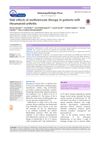 20 citations,
January 2013 in “Evidence-based complementary and alternative medicine”
20 citations,
January 2013 in “Evidence-based complementary and alternative medicine” TGPC plus CGT is effective and safe for treating severe alopecia areata in children.
18 citations,
August 2012 in “Chinese journal of integrative medicine/Chinese Journal of Integrative Medicine” Both treatments for alopecia areata are equally effective and safe.
 11 citations,
November 2022 in “JAMA dermatology”
11 citations,
November 2022 in “JAMA dermatology” Some nutritional supplements may help treat hair loss with generally mild side effects.
 January 2015 in “Hair therapy & transplantation”
January 2015 in “Hair therapy & transplantation” Some botanical products may help increase hair growth in people with alopecia, but more research is needed.
 41 citations,
September 2018 in “Australasian journal of dermatology”
41 citations,
September 2018 in “Australasian journal of dermatology” No systemic treatment for alopecia areata has strong evidence of effectiveness.
 3 citations,
August 2021 in “Cutis”
3 citations,
August 2021 in “Cutis” Some alternative medicine treatments might work for skin conditions, but their effectiveness and safety differ a lot.
 72 citations,
July 2014 in “American journal of clinical dermatology”
72 citations,
July 2014 in “American journal of clinical dermatology” Some treatments, like corticosteroids and sensitizing agents, can help with alopecia areata, but more high-quality research is needed.
 April 2023 in “Tikrit journal of pharmaceutical sciences”
April 2023 in “Tikrit journal of pharmaceutical sciences” Ginger extract helps hair growth and reduces the need for prednisolone in alopecia areata patients.
 October 2023 in “Frontiers in endocrinology”
October 2023 in “Frontiers in endocrinology” Effective PCOS treatments require targeting specific signaling pathways.
 January 2025 in “Frontiers in Genetics”
January 2025 in “Frontiers in Genetics” Combining minoxidil and plant extracts improved hair growth in a boy with a rare genetic disorder.
 4 citations,
November 2021 in “Pharmaceuticals”
4 citations,
November 2021 in “Pharmaceuticals” Paeonia lactiflora and Poria cocos extracts can potentially increase hair growth and reduce hair loss symptoms by lowering testosterone and inflammation levels.
9 citations,
June 2023 in “Cells” Certain natural and synthetic compounds may help treat inflammatory skin diseases by targeting a specific signaling pathway.
23 citations,
February 2021 in “Dermatologic therapy” Some treatments like pentoxifylline with topical corticosteroids might work for alopecia areata, but more research is needed to find the best one.
 2 citations,
June 2021 in “Immunopathologia Persa”
2 citations,
June 2021 in “Immunopathologia Persa” Methotrexate is effective for rheumatoid arthritis but often causes side effects like nausea and liver issues.
 July 2024 in “Journal of Dermatological Treatment”
July 2024 in “Journal of Dermatological Treatment” Botanical extracts and Minoxidil improved hair condition in a boy with a genetic disorder.
 4 citations,
March 2023 in “Current Oncology”
4 citations,
March 2023 in “Current Oncology” Scalp cooling is the only FDA-approved method to prevent hair loss from chemotherapy, but other treatments like minoxidil and PRP are being tested.
 46 citations,
August 2019 in “Journal of Ethnopharmacology”
46 citations,
August 2019 in “Journal of Ethnopharmacology” Eclipta prostrata has many traditional uses and health benefits, but more research is needed to understand how it works and ensure it's safe.
 49 citations,
October 2014 in “International Scholarly Research Notices”
49 citations,
October 2014 in “International Scholarly Research Notices” Eclipta alba has many health benefits and contains compounds with potential for drug development.
 16 citations,
September 2018 in “Journal of Ethnopharmacology”
16 citations,
September 2018 in “Journal of Ethnopharmacology” Plant-based remedies may treat hair loss by reducing inflammation and improving insulin resistance.
 170 citations,
September 2019 in “Evidence-based Complementary and Alternative Medicine”
170 citations,
September 2019 in “Evidence-based Complementary and Alternative Medicine” Some medicinal plants can help heal wounds and may lead to new treatments.
 11 citations,
February 2021 in “Trends in Food Science and Technology”
11 citations,
February 2021 in “Trends in Food Science and Technology” Impatiens plants have health-promoting compounds and are used for natural food coloring, but more research is needed to understand their full benefits.
 8 citations,
April 2020 in “Journal of Ethnopharmacology”
8 citations,
April 2020 in “Journal of Ethnopharmacology” Herbs might help with hair loss, but more research is needed to confirm their safety and effectiveness.
1 citations,
July 2022 in “Clinical, Cosmetic and Investigational Dermatology” Taohong Siwu Decoction may help treat hair loss by targeting multiple genes and pathways.
 March 2014 in “Journal of The American Academy of Dermatology”
March 2014 in “Journal of The American Academy of Dermatology” The document lists various dermatology topics, treatments, and diagnostic methods.
 December 2023 in “Research in pharmacy”
December 2023 in “Research in pharmacy” Phytotherapeutic compounds and supplements can help manage Polycystic Ovarian Syndrome (PCOS).
 January 1993 in “Side effects of drugs annual”
January 1993 in “Side effects of drugs annual” Natural products like propolis are causing more skin allergies, and certain skin treatments and medications have various side effects and risks.
 37 citations,
January 2015 in “Evidence-based Complementary and Alternative Medicine”
37 citations,
January 2015 in “Evidence-based Complementary and Alternative Medicine” An extract from Quercus acutissima bark was found to reduce sebum production and block an enzyme linked to acne.

Ayurvedic herbs may reduce side effects and improve effectiveness of cancer treatments.
 6 citations,
April 2017 in “Frontiers in Pharmacology”
6 citations,
April 2017 in “Frontiers in Pharmacology” Chinese medicine may help treat hair loss by affecting genes and enzyme activity.
 4 citations,
September 2020 in “Andrologia”
4 citations,
September 2020 in “Andrologia” Oregano extract helps fix testis and sperm damage caused by finasteride.

























